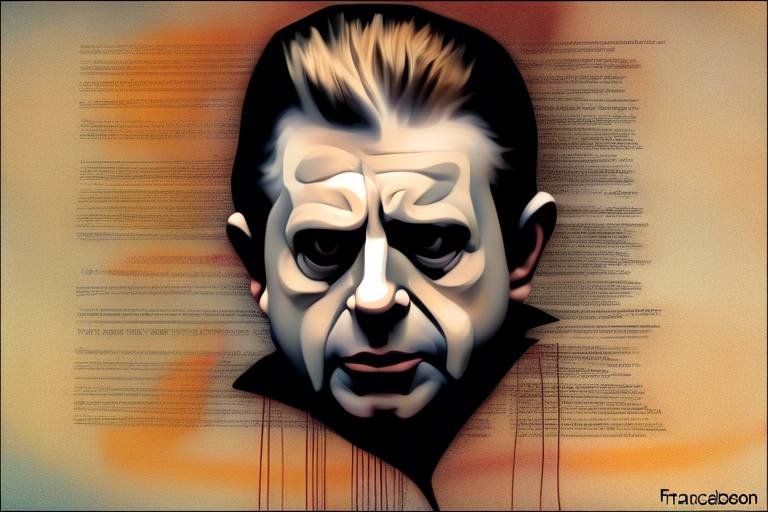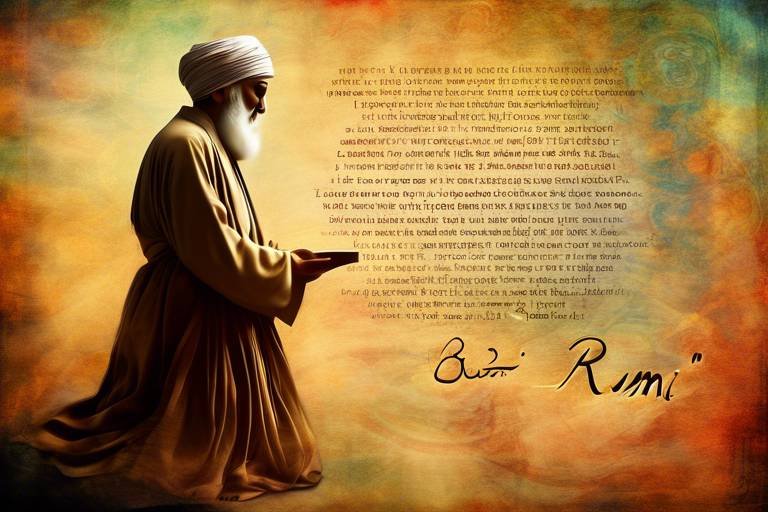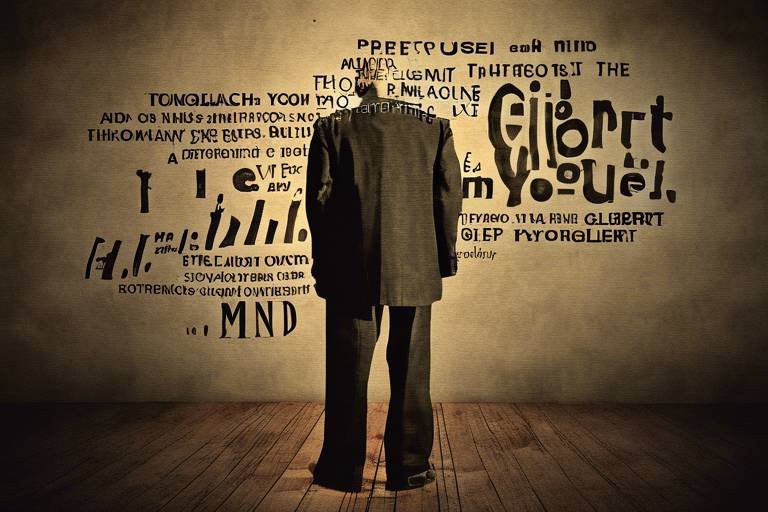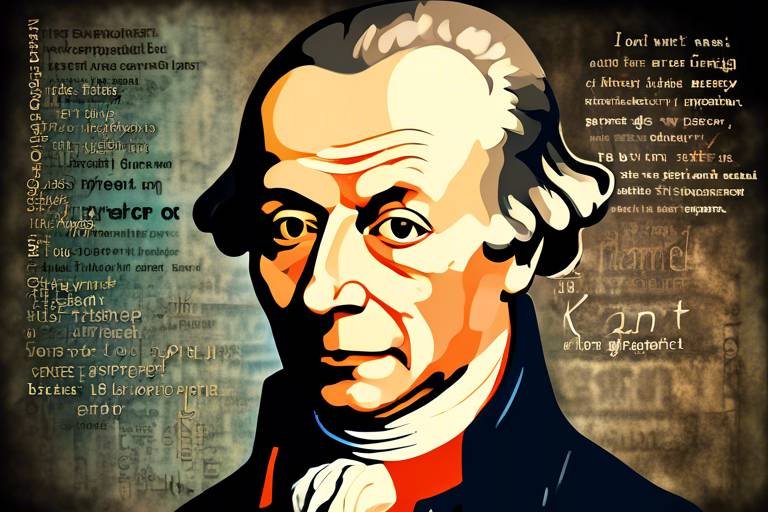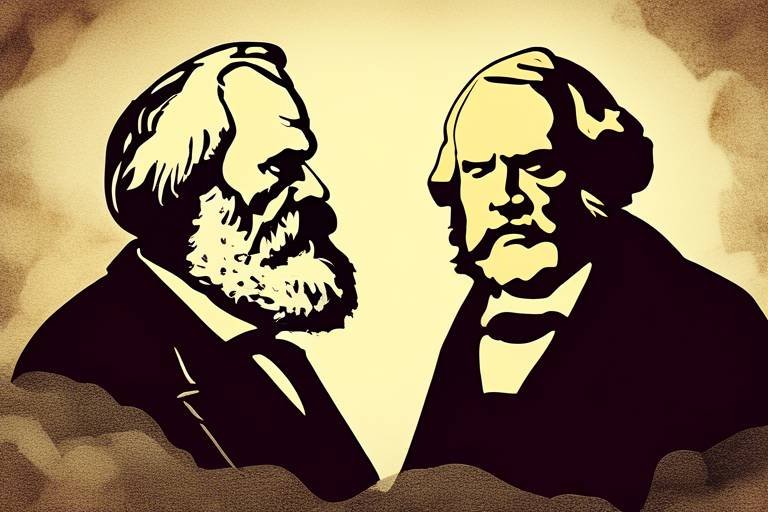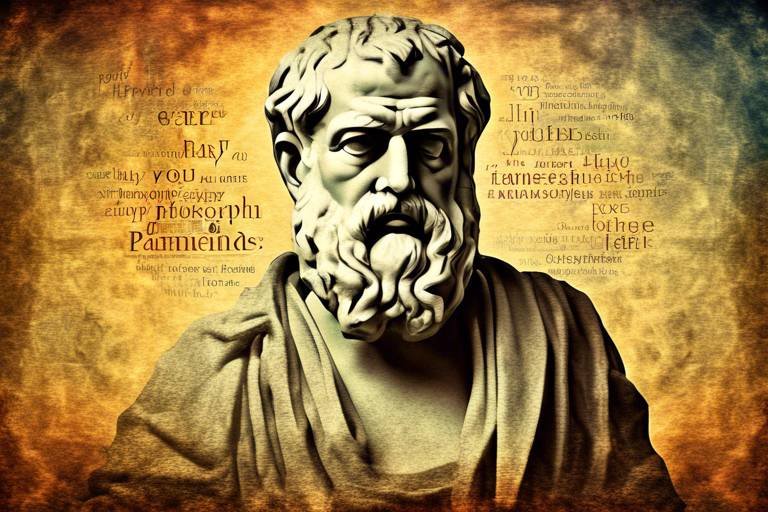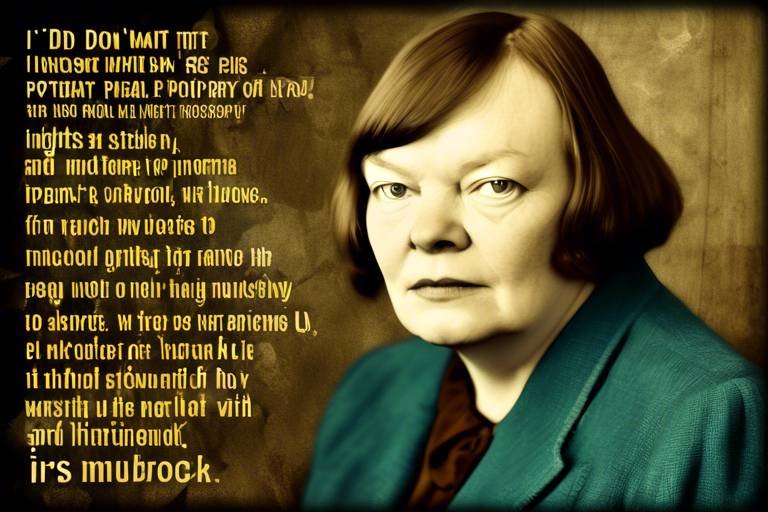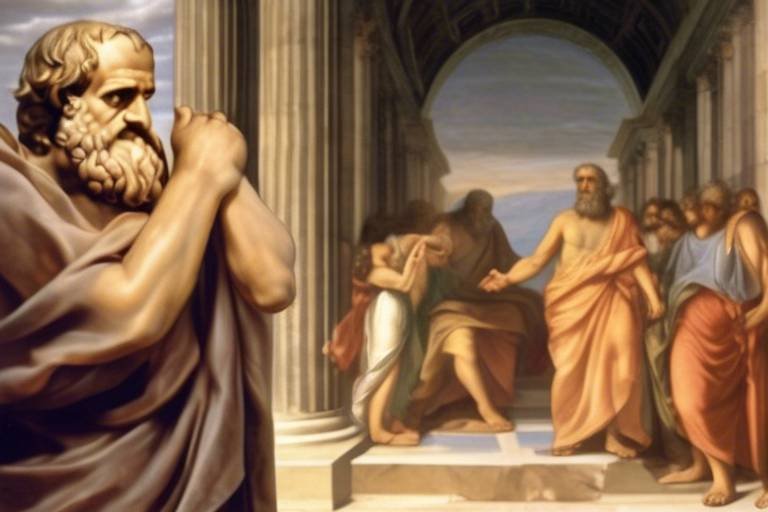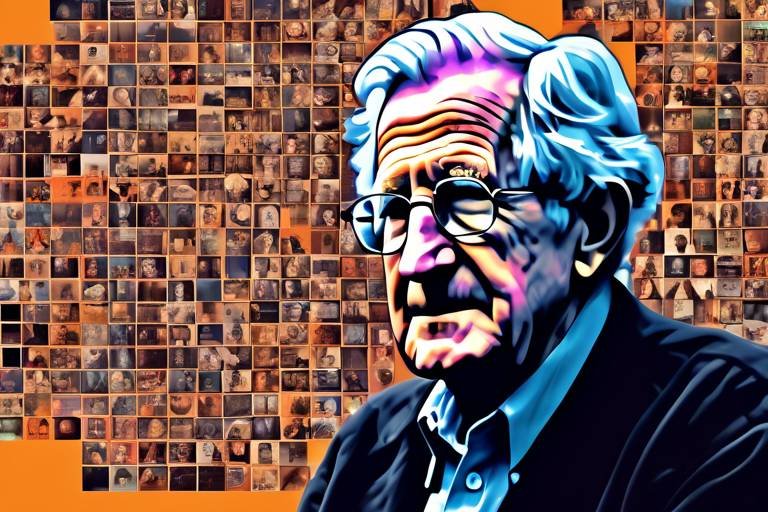Jean-Jacques Rousseau’s Philosophy of the Social Contract
Jean-Jacques Rousseau, a name that echoes through the halls of political philosophy, is best known for his groundbreaking ideas surrounding the social contract. His work has sparked debates and inspired revolutions, making him a pivotal figure in the evolution of modern political thought. But what exactly is this social contract that Rousseau speaks of? At its core, the social contract is a theoretical agreement among individuals to form a society, relinquishing some of their natural freedoms in exchange for the protection and benefits of communal living. It’s like trading in your solitary existence in the wild for a bustling city life where you can thrive alongside others. This transition from a state of nature to a structured society is not merely a shift in living conditions; it represents a profound transformation in how individuals relate to one another and to the governing bodies that emerge from this collective agreement.
Rousseau’s philosophy emphasizes that the social contract is rooted in mutual consent. Imagine a group of friends deciding to create a club. They agree on the rules that will govern their interactions, ensuring that everyone has a say and that no one’s voice is drowned out. Similarly, Rousseau argues that a legitimate society must be built on the foundation of collective agreement, where individuals willingly come together to create laws and institutions that reflect their shared values and aspirations. This is not just about governance; it’s about establishing a sense of belonging and community that honors the inherent dignity of each person involved.
As we delve deeper into Rousseau's thoughts, we uncover his views on the transition from the natural state to civil society. In the natural state, individuals are driven by their instincts and desires, much like animals responding to their environment. However, Rousseau posits that this instinctual living lacks the structure necessary for true human flourishing. Civil society, on the other hand, introduces laws and institutions that regulate behavior and promote the common good. It’s like moving from a chaotic playground where anything goes to a well-organized sports game where everyone knows the rules and plays their part. This shift is essential, as it allows individuals to coexist peacefully while pursuing their interests, ultimately leading to a more harmonious society.
At the heart of Rousseau's social contract theory lies the concept of the general will. This idea represents the collective interests of the people, transcending individual desires or private interests. Think of it as a choir where each singer contributes their unique voice to create a beautiful harmony. In the same way, Rousseau argues that true sovereignty resides in the general will, which is the sum of the collective aspirations of the populace. Understanding this concept is crucial, as it guides the community towards a common goal, ensuring that individual preferences do not overshadow what is best for society as a whole.
Moreover, Rousseau asserts that for a government to be legitimate, it must align with the general will. This means that laws should reflect the collective agreement of the people, fostering true democracy and civic responsibility. It’s a powerful notion that challenges us to rethink how we engage with our governments. Are we merely subjects to be ruled, or are we active participants in shaping the laws that govern us? Rousseau's philosophy pushes us to embrace our roles as citizens, encouraging us to advocate for a society that truly reflects our shared values and aspirations.
As we navigate through Rousseau's ideas, we also encounter his emphasis on freedom and equality. He argues that true freedom is not found in unchecked individualism but in participating in the collective decision-making process. This perspective is revolutionary, suggesting that our liberation comes from our interconnectedness rather than isolation. In a world where we often prioritize personal gain, Rousseau reminds us that our greatest strength lies in unity and collaboration, reinforcing the idea that we are stronger together.
In conclusion, Rousseau's philosophy of the social contract is not just a historical concept; it is a living idea that continues to influence our understanding of governance, citizenship, and community. His thoughts challenge us to reflect on our roles within society and inspire movements for social justice and political reform. As we engage with his ideas, we are reminded that the essence of our humanity lies in our connections with one another, and the social contract is a testament to our shared journey towards a more just and equitable world.
- What is the social contract according to Rousseau?
The social contract is an agreement among individuals to form a society, where they give up some freedoms for the benefits of communal living.
- How does Rousseau differentiate between natural state and civil society?
In the natural state, individuals act on instincts, while in civil society, laws and institutions are established to maintain order and promote the common good.
- What is the general will?
The general will reflects the collective interests of the people, guiding society towards common welfare and moral integrity.
- Why is Rousseau's philosophy relevant today?
Rousseau's ideas continue to resonate in discussions about democracy, individual rights, and the legitimacy of state power, influencing movements for social justice.

The Concept of the Social Contract
Jean-Jacques Rousseau's concept of the social contract is a revolutionary idea that reshapes our understanding of society and governance. At its core, the social contract is an implicit agreement among individuals to form a collective society. This agreement marks a significant transition from the state of nature, where individuals enjoy absolute freedom, to a structured civil society, where freedom is tempered by the necessity of laws and governance. But why is this transition so crucial?
In Rousseau's view, when individuals come together to form a society, they do so out of a mutual desire for security, cooperation, and the common good. This collective decision is not merely about obeying rules; it’s about creating a framework where everyone can thrive together. Imagine a group of people stranded on a deserted island. Initially, they might live freely, following their instincts. However, as conflicts arise over resources, they realize that establishing some form of governance—like rules for sharing food or assigning roles—becomes essential for their survival and well-being.
The social contract, therefore, is not just a theoretical concept; it’s a practical necessity. Rousseau argues that through this contract, individuals agree to surrender some of their natural freedoms in exchange for the protection and benefits of living in a society. This idea raises a fundamental question: how do we ensure that this contract serves the interests of all, rather than just a select few? The answer lies in the principles of mutual consent and collective governance.
To better understand the implications of Rousseau's social contract, consider the following key points:
- Mutual Consent: Every member of society must agree to the terms of the social contract, ensuring that no one is forced into a system they do not support.
- Collective Governance: The laws and rules established must reflect the will of the people, promoting the common good rather than individual interests.
- Transition from Natural to Civil Freedom: This transition emphasizes that true freedom is not just about the absence of restrictions, but about participating in the decision-making processes that affect one’s life.
Rousseau's social contract theory challenges us to rethink our relationship with authority and governance. It invites us to ask whether we are merely subjects of a state or active participants in shaping our collective future. This perspective is not only relevant in Rousseau's time but also resonates deeply in today’s political landscape, where questions of representation, democracy, and civic engagement are more pressing than ever.
In essence, the social contract is a call to action. It urges individuals to engage with their communities, to advocate for laws that reflect the collective will, and to understand that true freedom is found in solidarity with others. As we navigate the complexities of modern society, Rousseau's insights remind us that our strength lies in our unity and shared purpose.

Natural State vs. Civil Society
Jean-Jacques Rousseau's exploration of the natural state versus civil society is a fascinating journey into the essence of human existence and social organization. At the core of his philosophy lies the belief that humans, in their natural state, are inherently good, living in harmony with their instincts and the environment. Imagine a world where people are free to act upon their basic needs and desires, unencumbered by the complexities of societal rules. This is Rousseau's vision of the natural state—a state of pure freedom, where individuals are guided by their innate sense of right and wrong.
However, as Rousseau argues, this idyllic existence is not sustainable in a world that is growing increasingly complex. Enter civil society, a construct that emerges from the need for order and cooperation among individuals. In this new world, laws and institutions take center stage, transforming the way we interact with one another. While civil society brings about structure, it also introduces challenges that can compromise individual freedom. Think of it like a beautiful garden; it requires careful tending and boundaries to thrive, but those very boundaries can sometimes feel restrictive.
Rousseau posits that the transition from the natural state to civil society is marked by a crucial agreement among individuals—the social contract. This contract represents a mutual consent to form a collective society, where individuals agree to relinquish some of their natural freedoms in exchange for the protection and benefits that come with living in a structured community. It's as if we’re trading a wild, unkempt garden for a meticulously organized one, complete with rules about who can plant what and where. While this brings order, it also demands a level of conformity that can feel stifling.
In civil society, the individual's role shifts dramatically. No longer are people mere instinct-driven beings; they become participants in a larger social framework. This transformation leads to the establishment of laws designed to promote the common good, but it also raises questions about the balance between individual liberty and collective authority. How do we ensure that the rules we create serve everyone equally? Are we sacrificing too much of our freedom for the sake of order?
To further understand this concept, let’s consider a comparison table that highlights the key differences between the natural state and civil society:
| Aspect | Natural State | Civil Society |
|---|---|---|
| Freedom | Absolute freedom, guided by instincts | Limited freedom, governed by laws |
| Social Structure | No formal structure, purely instinctual | Structured with institutions and laws |
| Individuality | Emphasis on individual desires | Emphasis on collective interests |
| Common Good | Natural harmony among individuals | Requires laws to maintain order |
Ultimately, Rousseau's examination of the natural state versus civil society sheds light on the delicate balance we must strike between freedom and order. As we navigate our modern world, these age-old questions remain relevant. Are we truly free in our structured societies, or have we traded too much of our natural liberty for the safety and predictability of laws? The answers may vary, but Rousseau's insights encourage us to reflect on our roles as both individuals and members of a collective.
- What is the natural state according to Rousseau? The natural state is where individuals act on their instincts and live freely, without the constraints of societal rules.
- How does civil society differ from the natural state? Civil society introduces laws and institutions that regulate behavior, often limiting individual freedoms for the sake of order and the common good.
- What is the social contract? The social contract is an agreement among individuals to form a society, sacrificing some natural freedoms for protection and benefits.
- Why is the balance between freedom and authority important? Striking a balance is crucial to ensuring that laws protect individual rights while promoting the welfare of the community as a whole.

The Role of General Will
When we dive into the depths of Jean-Jacques Rousseau's philosophy, one concept that stands out like a lighthouse in a stormy sea is the idea of the general will. This notion is not just a theoretical construct; it is the very essence of Rousseau’s vision for a just society. Imagine a community where everyone’s voice is not just heard but harmonized into a single melody that represents the collective interest of the people. That’s the general will for you!
At its core, the general will is about the common good. It transcends individual desires and preferences, aiming for what is best for the community as a whole. Rousseau believed that true sovereignty lies not with individual whims but with this collective will. Think of it as a giant tapestry woven together by the threads of individual contributions, where each thread is crucial to the overall picture. In a society guided by the general will, laws and policies are crafted not merely to serve the interests of a few but to reflect the aspirations and needs of the entire populace.
To further understand the implications of the general will, consider the following key points:
- Collective Interest: The general will embodies the collective interest, which is often different from the sum of individual interests. It seeks to achieve harmony within the community.
- Legitimacy of Governance: For a government to be legitimate, it must align with the general will. This means that laws should not favor a select group but rather uphold the values and needs of the entire society.
- Active Participation: Rousseau emphasized that citizens must actively participate in the formation of the general will. This participation is essential for fostering civic responsibility and ensuring that the government remains accountable.
Rousseau’s perspective on the general will raises intriguing questions about democracy and freedom. If true freedom is found in participation, then how do we ensure that every voice is valued and that the general will is truly representative? It’s a delicate balance, akin to walking a tightrope where one misstep could lead to the erosion of individual liberties in favor of collective authority.
Moreover, the concept of the general will also has profound implications for governance. Rousseau argued that a government must be an extension of the general will, ensuring that laws reflect the collective agreement of the populace. This idea challenges us to rethink our political systems—are they truly representative, or do they serve the interests of a powerful few? By aligning governance with the general will, we can foster a society that is not just democratic in name but in practice.
In conclusion, the role of the general will in Rousseau’s philosophy is a call to action. It invites us to engage in meaningful dialogue and collective decision-making, reminding us that our strength lies in unity. By embracing the general will, we can build a society that not only respects individual freedoms but also nurtures the common good, creating a more equitable world for all.
- What is the general will? The general will is the collective interest of the community that transcends individual preferences, guiding the society towards common welfare.
- How does the general will relate to democracy? The general will is fundamental to democracy as it emphasizes the need for collective decision-making and active participation of citizens in governance.
- Can the general will lead to authoritarianism? While Rousseau’s concept aims for collective good, critics argue that it could potentially suppress individual liberties in favor of collective authority.

Defining the General Will
Understanding the concept of the general will is crucial to grasping Rousseau's philosophy. At its core, the general will represents the collective interests of the community, transcending individual desires and preferences. Imagine a large group of friends deciding on a restaurant for dinner. While each person may have their own favorite place, the group seeks a consensus that reflects the best choice for everyone involved. This is akin to Rousseau's vision of the general will, where the focus is on what benefits the community as a whole rather than just individual whims.
Rousseau argues that the general will is not merely the sum of individual preferences; instead, it embodies a higher moral purpose that guides the community towards the common good. He believed that when individuals come together to form a society, they must set aside personal interests to engage in a collective decision-making process. This process requires a deep sense of civic responsibility and awareness of the needs of others, fostering a moral framework within which citizens can operate.
To further illustrate this concept, consider the following key aspects of the general will:
- Collective Interest: The general will prioritizes what is best for the community, rather than individual gains.
- Moral Integrity: It reflects a moral dimension that seeks to elevate society as a whole.
- Legitimacy of Laws: Laws should be based on the general will to ensure they serve the common good.
Rousseau also emphasizes that the general will is dynamic and can change over time as the needs and values of society evolve. This adaptability is essential for maintaining a healthy and responsive governance structure. In essence, the general will is the foundation upon which legitimate authority is built, as it ensures that the laws and policies enacted by the state resonate with the collective aspirations of its citizens.
In summary, defining the general will involves recognizing it as a guiding principle that transcends individual desires, aiming to promote the welfare and moral integrity of the community. It is this concept that underpins Rousseau's vision of a just and equitable society, where true freedom is realized through active participation in the collective decision-making process.
- What is the general will? The general will is the collective interest of the community that transcends individual preferences.
- How does the general will relate to democracy? The general will serves as a foundation for democratic governance, ensuring that laws reflect the collective agreement of the populace.
- Can the general will change over time? Yes, the general will is dynamic and can evolve as societal needs and values change.

Implications for Governance
Rousseau's philosophy of the social contract carries profound implications for governance, fundamentally reshaping our understanding of authority and legitimacy. At the heart of his argument is the idea that a government's legitimacy stems from its alignment with the general will of the people. This concept challenges traditional notions of power, suggesting that authority should not merely be a top-down imposition but rather a reflection of the collective agreement and aspirations of the populace.
In practical terms, this means that laws and policies must be crafted in a way that resonates with the common interests of the community. Rousseau argues that when a government strays from the general will, it risks becoming tyrannical, prioritizing the desires of a few over the welfare of the many. This raises critical questions about the role of citizens in governance. Are they mere subjects of the law, or are they active participants in shaping the laws that govern them?
To ensure that governance remains true to the general will, Rousseau advocates for a system that emphasizes direct democracy and civic engagement. This could take various forms, such as:
- Regular public assemblies where citizens can voice their opinions.
- Mechanisms for referendums to decide on critical issues directly.
- Transparent processes that allow citizens to hold their leaders accountable.
Moreover, Rousseau's ideas imply that education plays a crucial role in governance. An informed citizenry is essential for understanding and articulating the general will. Therefore, the state has an obligation to promote education that cultivates civic responsibility and critical thinking. This educational foundation is vital for empowering individuals to engage meaningfully in the political process.
Ultimately, Rousseau's vision for governance is one where the lines between the government and the governed are blurred, fostering a relationship built on mutual respect and shared goals. This perspective not only encourages participation but also reinforces the idea that true freedom is found in the collective pursuit of the common good. As we navigate contemporary political landscapes, Rousseau's insights remind us that the essence of governance lies in its responsiveness to the will of the people, ensuring that every voice matters in the symphony of democracy.
- What is the social contract according to Rousseau?
The social contract is an agreement among individuals to form a collective society, transitioning from natural freedom to civil freedom through mutual consent. - How does Rousseau define the general will?
The general will represents the collective interests of the people, transcending individual preferences and guiding the community towards collective welfare. - What are the implications of Rousseau's philosophy for modern governance?
His ideas suggest that legitimate government must reflect the general will, promoting democracy and civic responsibility while ensuring laws align with the common interest. - What role does education play in Rousseau's vision of governance?
Education is crucial for cultivating an informed citizenry capable of engaging in the political process and articulating the general will.

Freedom and Equality
When we dive into Jean-Jacques Rousseau's philosophy, we quickly realize that he places a profound emphasis on the concepts of freedom and equality. But what does that really mean? Rousseau argues that true freedom isn't just about doing whatever you please; rather, it’s about participating in the collective decision-making process of society. Imagine a vibrant community where every voice matters—this is the essence of freedom according to Rousseau. In his view, freedom is not a solitary experience but a shared journey, where individuals come together to forge laws and norms that reflect their collective will.
Furthermore, Rousseau believes that equality is essential for achieving this kind of freedom. He suggests that in a society where inequalities are rampant, the very fabric of freedom begins to unravel. Think about it: how can one truly be free if they are shackled by economic disparity or social injustice? Rousseau's vision of equality isn't just about equal rights on paper; it’s about creating a level playing field where everyone has a stake in the community's decisions. This leads us to consider how modern societies grapple with these ideals. Are we truly free, or are we merely living under the illusion of freedom while systemic inequalities persist?
Rousseau also highlights the importance of civic responsibility in the context of freedom and equality. He argues that individuals must not only enjoy their rights but also actively participate in civic life. This can be likened to a well-tuned orchestra: each musician must play their part for the symphony to be harmonious. When citizens engage in the political process, they contribute to the common good, ensuring that their voices resonate in the halls of power. This engagement fosters a sense of belonging and reinforces the notion that freedom and equality are not just lofty ideals but practical realities that require our active participation.
However, achieving this balance is no easy feat. In today’s world, we often see tensions between individual rights and collective responsibilities. For instance, while we cherish our freedom of speech, we must also consider the impact our words have on others. Rousseau's philosophy invites us to reflect on these dilemmas and encourages a dialogue about how we can cultivate a society where both freedom and equality thrive.
In summary, Rousseau’s perspective on freedom and equality challenges us to rethink our roles as citizens. It compels us to ask ourselves: Are we merely passive observers in our societies, or are we active participants in shaping the world around us? By embracing the principles of freedom and equality, we can contribute to a more just and equitable society, where each individual has the opportunity to flourish.
- What is the main idea of Rousseau's philosophy regarding freedom? Rousseau believes that true freedom is achieved through participation in collective decision-making, rather than through individualism.
- How does Rousseau define equality? He views equality as essential for freedom, arguing that societal inequalities undermine true liberty.
- What role does civic responsibility play in Rousseau's philosophy? Civic responsibility is crucial; individuals must actively participate in governance to ensure that freedom and equality are upheld.
- How do Rousseau's ideas apply to modern society? His concepts challenge us to consider the balance between individual rights and collective responsibilities in today's political landscape.

The Impact on Modern Political Thought
Jean-Jacques Rousseau's philosophy has left an indelible mark on modern political thought, shaping the very foundations of contemporary democracy and social justice. His ideas about the social contract, the general will, and the relationship between the individual and the state have sparked debates that continue to resonate today. Imagine a world where the voices of the people are not drowned out by the clamor of authority; this is the essence of Rousseau's vision. He believed that a legitimate government must be rooted in the collective will of its citizens, fostering a sense of belonging and responsibility among them.
Rousseau's assertion that "man is born free, and everywhere he is in chains" highlights the struggle between individual liberty and societal constraints. This paradox has led to a rich tapestry of discussions around individual rights and the legitimacy of state power. In modern political theory, we often see Rousseau's influence in the emphasis on participatory democracy, where citizens engage actively in the decision-making processes that affect their lives. His ideas challenge us to question: How do we balance the needs of the community with the rights of the individual?
Furthermore, Rousseau's thoughts have inspired various movements for social justice and political reform. His belief in equality as a cornerstone of societal structure has fueled advocacy for marginalized groups, pushing for a more equitable distribution of power and resources. The implications of his work can be seen in contemporary debates about wealth inequality, civil rights, and the role of government in ensuring social welfare. These discussions are not just theoretical; they manifest in real-world policies and political actions that strive to embody Rousseau's ideals.
| Key Concepts | Modern Applications |
|---|---|
| Social Contract | Foundation of democratic governance and civic engagement |
| General Will | Collective decision-making and public policy |
| Freedom and Equality | Movements for civil rights and social justice |
Rousseau's legacy is not without its challenges, however. Critics argue that his vision can lead to potential authoritarianism, where the collective will might suppress individual freedoms. This tension between the community's needs and personal liberties raises important questions for modern society: How do we ensure that the general will does not become a tool for oppression? Are we truly free when our lives are dictated by the majority?
In conclusion, the impact of Rousseau's philosophy on modern political thought is profound and multifaceted. His ideas encourage us to reflect on the nature of governance, the role of citizens, and the ethical foundations of our society. As we navigate the complexities of contemporary political landscapes, Rousseau's insights continue to guide us in our quest for a fairer and more just world.
- What is the social contract according to Rousseau?
Rousseau's social contract is an agreement among individuals to form a collective society, transitioning from natural freedom to civil freedom through mutual consent and governance.
- How does Rousseau define the general will?
The general will represents the collective interests of the people, transcending individual preferences to guide the community towards the common good.
- What are the implications of Rousseau's ideas for modern democracy?
Rousseau's philosophy emphasizes participatory democracy, where citizens actively engage in decision-making, ensuring that governance reflects the collective will.
- What critiques exist regarding Rousseau's philosophy?
Critics argue that Rousseau's ideas may lead to authoritarianism and raise concerns about the balance between individual liberty and collective authority.

Critiques of Rousseau's Ideas
Jean-Jacques Rousseau's philosophy, particularly his social contract theory, has sparked a variety of critiques that delve into its practicality, implications, and the balance it strikes between individual liberty and collective authority. One of the most significant criticisms centers around the feasibility of his concepts. Critics argue that while Rousseau envisions a society governed by the general will, achieving such a state is not only challenging but may also be impossible in practice. The idea of a collective interest that transcends individual preferences can lead to a homogenization of thought, stifling diversity and personal freedoms.
Moreover, detractors point out that the potential for authoritarianism looms large within Rousseau's framework. When the general will is prioritized, the risk arises that those in power may manipulate this concept to justify oppressive measures against dissenting voices. This concern is particularly relevant in contemporary discussions about governance, where the line between the common good and individual rights often blurs. For instance, a government claiming to act on behalf of the general will might suppress minority opinions, arguing that they threaten societal harmony.
Another critique focuses on the inherent tension between individual liberty and collective authority in Rousseau's philosophy. While he champions the idea that true freedom is found in participation in the collective decision-making process, critics argue that this can lead to a paradox. If the collective will overrides individual desires, how can one truly claim to be free? This question resonates deeply in today's political climate, where the balance between personal freedoms and societal obligations is continually debated.
In addition, some scholars have pointed out that Rousseau’s romanticization of the natural state overlooks the complexities of human behavior and social dynamics. The notion that individuals can return to a state of pure, instinctual freedom ignores the realities of societal interdependence and the necessity of structured governance to maintain order. Critics argue that his idealism may not align with the practical needs of a modern, diverse society.
Despite these critiques, Rousseau's contributions remain pivotal in political philosophy. His ideas provoke essential discussions about the nature of freedom, the role of government, and the importance of civic responsibility. They challenge us to consider how we can reconcile individual rights with the needs of the community, a dilemma that continues to shape political discourse today.
- What is Rousseau's main argument in the social contract theory?
Rousseau argues that individuals come together to form a collective society through a social contract, where they agree to adhere to the general will for the sake of mutual benefit and civil freedom. - How does Rousseau define the general will?
The general will represents the collective interests of the people, serving as a guiding principle for governance that transcends individual desires. - What are the implications of Rousseau's ideas for modern democracy?
Rousseau's philosophy emphasizes the importance of civic participation and the alignment of laws with the general will, which are foundational to democratic governance. - What criticisms have been made against Rousseau's social contract?
Critics argue that Rousseau's ideas may lead to authoritarianism, overlook individual liberties, and are impractical in diverse societies.

Legacy of Rousseau's Philosophy
Jean-Jacques Rousseau's philosophy has left an indelible mark on the landscape of political thought, shaping our understanding of governance, citizenship, and the ethical foundations of society. His ideas about the social contract and the general will have not only inspired revolutions but have also provided a framework for modern democratic principles. Imagine a world where the collective voice of the people reigns supreme, where individual desires are harmonized into a common good—this is the essence of Rousseau's vision.
One of the most significant legacies of Rousseau's thought is his profound influence on the concept of democracy. He challenged the notion of absolute monarchy and argued that political legitimacy stems from the consent of the governed. This idea resonates strongly in contemporary democratic societies, where the authority of the state is derived from the will of the people. Rousseau's assertion that "Man is born free, and everywhere he is in chains" serves as a rallying cry for those advocating for individual rights and freedoms.
Moreover, Rousseau's emphasis on equality has sparked discussions about social justice and the role of government in ensuring equitable treatment for all citizens. He believed that a just society must prioritize the welfare of its members, promoting policies that aim to reduce inequality and foster social cohesion. In this sense, Rousseau can be seen as a precursor to modern social movements that seek to address systemic injustices.
His ideas have also permeated educational theory, advocating for a pedagogy that nurtures the innate goodness of children and encourages them to develop their moral and civic virtues. The influence of Rousseau can be seen in various educational reforms that prioritize experiential learning and the development of critical thinking skills over rote memorization.
To illustrate Rousseau's enduring impact, consider the following table that highlights key areas of influence:
| Area of Influence | Rousseau's Contribution | Modern Implications |
|---|---|---|
| Political Philosophy | Social Contract Theory | Foundation for democratic governance |
| Social Justice | Emphasis on equality | Inspiration for social movements |
| Education | Naturalism in education | Focus on experiential learning |
However, Rousseau's legacy is not without its critiques. Some argue that his vision can lead to a form of collectivism that undermines individual freedoms. The tension between individual liberty and collective authority remains a hot topic in political discourse today. Yet, despite these critiques, Rousseau's work continues to inspire and provoke thought, ensuring his place as a pivotal figure in the history of political philosophy.
In summary, Rousseau's philosophy has not only shaped our understanding of democracy and social justice but has also paved the way for ongoing discussions about the role of government and the rights of individuals. His legacy is a testament to the power of ideas in fostering change and challenging the status quo, making him a timeless figure in the evolution of political thought.
- What is the social contract according to Rousseau?
Rousseau's social contract is an agreement among individuals to form a collective society, transitioning from natural freedom to civil freedom through mutual consent and governance.
- How does Rousseau define the general will?
The general will reflects the collective interests of the people, guiding the community towards the common good and moral integrity, transcending individual preferences.
- What is Rousseau's view on freedom and equality?
Rousseau believes that true freedom is achieved not through individualism but through active participation in collective decision-making processes, emphasizing the importance of equality.
- How has Rousseau influenced modern political thought?
Rousseau's ideas have profoundly impacted contemporary theories on democracy, individual rights, and the legitimacy of state power, inspiring movements for social justice and political reform.
Frequently Asked Questions
- What is the social contract according to Rousseau?
The social contract, as introduced by Rousseau, is an agreement among individuals to form a collective society. It represents a transition from natural freedom, where individuals act on instinct, to civil freedom, which is achieved through mutual consent and governance.
- How does Rousseau differentiate between the natural state and civil society?
Rousseau contrasts the natural state, where humans are guided by their instincts, with civil society, which necessitates laws and institutions. In civil society, individuals forgo some natural freedoms to ensure order and promote the common good.
- What is the general will and why is it important?
The general will is the collective interest of the people, reflecting what is best for the community as a whole. Rousseau argues that true sovereignty lies with this general will, emphasizing that laws should represent the collective agreement rather than individual desires.
- How does Rousseau’s philosophy address freedom and equality?
Rousseau believes that true freedom is not about individualism but rather about participating in collective decision-making. He emphasizes equality as essential to achieving this freedom, as it allows individuals to engage meaningfully in the social contract.
- What impact did Rousseau's ideas have on modern political thought?
Rousseau's ideas have significantly influenced contemporary political theories, especially regarding democracy, individual rights, and the legitimacy of state power. His thoughts have inspired movements advocating for social justice and political reform.
- What are some critiques of Rousseau's social contract theory?
While celebrated for its insights, Rousseau's social contract theory has faced criticism for its feasibility, potential for authoritarianism, and the tension it creates between individual liberty and collective authority.
- What is Rousseau's legacy in political philosophy?
Rousseau's contributions continue to resonate today, shaping discussions on governance, citizenship, and the ethical foundations of society. His work remains pivotal in the history of political thought, influencing how we view the relationship between individuals and the state.






